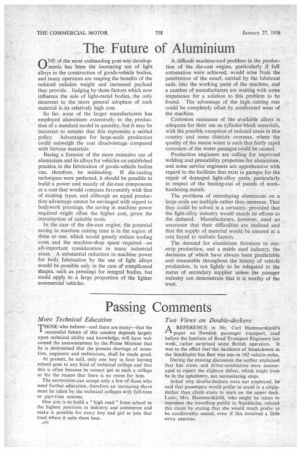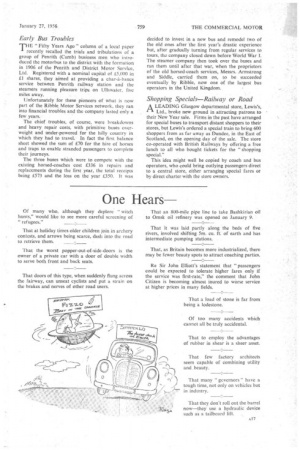Passing Comments
Page 18

Page 19

If you've noticed an error in this article please click here to report it so we can fix it.
More Technical Education
THOSE who believe—and there are many—that the
successful future of this country depends largely upon technical ability and knowledge, will have welcomed the announcement by the Prime Minister that he is determined that the present shortage of scientists, engineers and technicians, shall be made good.
At present, he said, only one boy in four leaving school goes to any kind of technical college and that this is often because he cannot get to such a college or for the reason that there is no room for him.
The universities can accept only a few of those who need further education, therefore an increasing share must be taken by the technical colleges with full-time or part-time courses.
One aim is to build a "high road" from school to the highest positions in industry and commerce and make it possible for every boy and girl to join that road where it suits them best.
Two Views on Double-deckers
A REFERENCE in Mr. Carl Hammarskjold's I-1 paper on Swedish passenger transport, read before the Institute of Road Transport Engineers last week, rather surprised some British operators. It was to the effect that the incidence of breakdowns in the Stockholm bus fleet was one in 162 vehicle-miles.
During the ensuing discussion the author explained that bus crews and driver-conductors were encouraged to report the slightest defect, which might even be in the upholstery, not necessitating stops.
Asked why double-deckers were not employed, he said that passengers would prefer to stand in a singledecker than climb stairs to seats on the upper deck. Later, Mrs. Hammarskjold, who might be taken to represent the travelling public in Stockholm, refuted this claim by stating that she would much prefer to be comfortably seated, even if this involved a little extra exercise.
Early Bus Troubles
THE "Fifty Years Ago" column of a local paper
recently recalled the trials and tribulations of a group of Penrith (Cumb) business men who introduced the motorbus to the district with the formation in 1906 of the Penrith and District Motor Service, Ltd. Registered with a nominal capital of £5,000 in £1 shares, they aimed at providing a char-a-bancs service between Penrith railway station and the steamers running pleasure trips on Ullswater, live miles away.
Unfortunately for these pioneers of what is now part of the Ribble Motor Services network, they ran into financial troubles and the company lasted only a few years.
The chief troubles, of course, were breakdowns and heavy repair costs, with primitive buses overweight and under-powered for the hilly country in which they had to travel. In fact the first balance sheet showed the sum of £70 for the hire of horses and traps to enable stranded passengers to complete their journeys.
The three buses which were to compete with the existing horsed-coaches cost £336 in repairs and replacements during the first year, the total receipts being £573 and the loss on the year £350. It was decided to invest in a new bus and remodel two of the old ones after the first year's drastic experience but, after gradually turning from regular services to tours, the company closed down before World War I. The steamer company then took over the buses and ran them until after that war, when the proprietors of the old horsed-coach services, Messrs. Armstrong and Siddle, carried them on, to be succeeded eventually by Ribble, now one of the largest bus operators in the United Kingdom.
Shopping Specials—Railway or Road
A LEADING Glasgow departmental store, Lewis's, " Ltd., broke new ground in attracting patrons to their New Year sale. Firms in the past have arranged for special buses to transport distant shoppers to their stores, but Lewis's ordered a special train to bring 600 shoppers from as far away as Dundee, in the East of Scotland, on the opening day of the sale. The store co-operated with British Railways by offering a free lunch to all who bought tickets for the "shopping special."
This idea might well be copied by coach and bus operators, who could bring outlying passengers direct to a central store, either arranging special fares or by direct charterwith the store owners.




































































